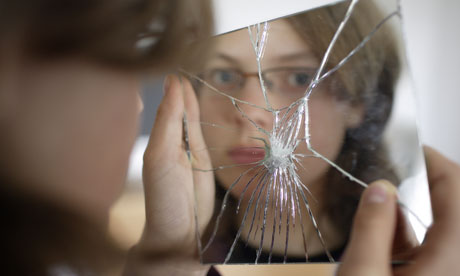
Suffering from body dysmorphic disorder (BDD) was like living trapped in a box lined with distorting mirrors. All I could see was my face, contorted and disgusting.
BDD is a form of obsessive compulsive disorder that affects around 1 in 200 people, according to the International OCD Foundation. Sufferers mistakenly believe an aspect of their appearance is deformed, which can drive them to undergo repeat plastic surgery procedures and, in some cases, even attempt suicide.
Five years ago, my disorder was at its height. I used to scratch at my face, or slap it, when looking in the mirror because I was so disgusted by my reflection. Now when I see myself I think I look fine – maybe pretty, certainly not hideous.
What brought about this change? Recovering from BDD is a long and ongoing process, made up of lots of small steps, but moving to university definitely made a huge difference.
If you are beautiful, everyone will love you forever and you'll be perfectly happy. If you're ugly, you'll be hated and miserable. Clearly these assumptions are just plain wrong, but I believed them for years.
It wasn't until year 12 that I first heard of BDD, and it took another six months for me to realise that I was suffering from it. The revelation that it was my mind (and not my face) that needed fixing marked a turning point. I started receiving counselling, doing more exercise, and making attempts to manage my anxiety. I began to feel like a different person…
But at school I was always shy, introverted and chronically lacking in confidence – it wasn't easy to get people to notice that I'd changed. University was different. Being in a new environment, with new people, helped me leave my obsessions behind.
Battling against BDD, I felt like an electrician trying to rewire my short-circuiting brain. The same image-obsessed thoughts used to play on a loop in my head. Preoccupied only by my hideous appearance, my world was a very narrow place. But with moving away from home, that began to change.
My university has 240 societies for students to join – 240! Signing up to take on lots of new challenges inspired me to think differently. BDD can be self-perpetuating: the more you hate the way you look, the more you isolate yourself; the more you isolate yourself, the more time you have to dwell on your physical imperfections. Simply being busy helped me break the cycle.
"Think critically." This maxim, hammered into my head by university professors, pushed me to reconsider my ideas about "beauty" and "body confidence". At school I was always flicking through fashion magazines, eager to soak up their advice on how to be thinner, prettier and all-round better. But as I got older I started to lose faith in these glossy weeklies and their pages full of perfect, primped models.
In my first year, I made the decision to stop buying women's magazines. I traded in Heat for books like The Beauty Myth by Naomi Wolf. Suddenly, I started to see that some of my most deeply held beliefs (like the idea that beauty equals happiness) were just nonsense – and it felt pretty good.
Can BDD be permanently cured? I'm not convinced. When things are going well for me, I forget I ever suffered from it. But when my life isn't running smoothly, I notice the obsessional thoughts and behaviours starting to creep back, so I know I can't become complacent.
Thankfully there are a number of organisations that provide information and ongoing support for BDD sufferers, including the BDD Foundation and the OCD Foundation. Going to university has played an important part in my recovery from BDD by showing me just how many exciting opportunities the world has to offer. I want to focus on them, not my face.
• This student blogger has chosen to keep her identity anonymous.

